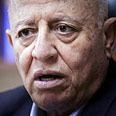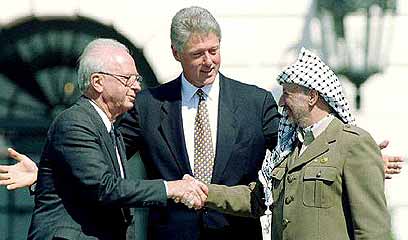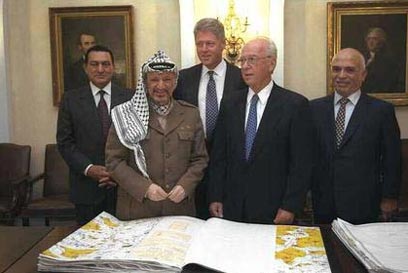
Queria: Rabin's murderers led to the current state
Former Palestinian PM, senior negotiator during Oslo peace talks sounds pessimistic as ever, 15 years after the assassination of Yitzhak Rabin. 'Bullets killed Rabin's promises as they did his life,' he says
Former Palestinian Prime Minister Ahmed Qureia is attending yet another peace conference in Egypt. As in the past 19 years, since the Madrid Summit, he will be discussing the fruitless peace process opposite Israel. A process he has been part of for many years and remains a controversy to this very day.
In 1993, when Yasser Arafat and Yitzhak Rabin marched on the White House lawns and signed the Oslo Accords, there might not have been any illusions, but there also was a sense of a different atmosphere, one that was not felt before or since.
The 15th anniversary of the assassination of prime minister Yitzhak Rabin, which is being marked Wednesday, is an opportunity for Queria to wonder what might have been.
When one hears Queria, who had spent considerable time with Rabin during the peace talks and was appointed Palestinian prime minister in 2003, one realizes how much has changed since 1995. "As far as the Palestinian leadership is concerned, negotiations have remained the main political tool, but we are not forsaking other options such as diplomatic activity, popular resistance and even armed resistance," he says.
"We are not forsaking the option of turning to the (UN) Security Council for recognition of a Palestinian state, and failing that – we'll demand an international mandate on the territories," he continues, echoing a plan recently unveiled by the Palestinian leadership. "In 1993, certainly in 1995, we never thought we'd get to this state."

Rabin and Arafat. Hand shake still engraved (Photo: Reuters)
The Palestinians are divided when it comes to the last years of negotiations. Israel is seen as the main guilty party, but there is also some internal criticism. Some describe Camp David as a "Palestinian missed opportunity." Not everyone believes that the five years allotted in the Oslo Accords to reach a final status agreement would have yielded true peace. And yet when the Palestinians weigh Israeli intentions it is generally agreed that the Rabin era stood apart from any other, before or since.
'Rabin wanted fences around settlements'
Queria sees the settlement construction freeze as the main aspect setting apart negotiations opposite Rabin and those opposite subsequent Israeli administrations. "I remember a meeting held at the Erez crossing in 1994, months after Arafat had returned to the Gaza Strip," he relates. "Rabin said he would build a barbed wire fence around each settlement, no further than five meters from the last house in every settlement – until the settlements' fate is decided in the final status agreement talks."
Queria says that later on, when he served as chairman of the Palestinian parliament and prime minister, "Rabin's promises, as well as his life, were quashed by Israeli extremists' bullets to punish him for Oslo."

Rabin, Clinton and Arab leaders (Photo: Avi Ohayon, BPO)
The former Palestinian prime minister says that the peace effort, which was significantly compromised after Rabin's murder, was even more severely damaged after Shimon Peres left office. "The shots that killed Rabin missed Shimon Peres' body, but not his political life, and he was replaced by (Benjamin) Netanyahu, who showed a hostile attitude towards peace and a favorable one towards settlements."
Looking back at the Netanyahu, Barak, Sharon and Olmert administrations, as well as the current Israeli administration, Queria describes Rabin's era as a shift "from Israeli strategy, which never recognized the Palestinians' full right to self determination."
"Those who murdered Rabin could not bear his flexibility and effectively led us to the current state," he says.
Another senior Palestinian official who was involved in the peace negotiations during the Rabin era, who wished to remain anonymous, has a more sober approach to that period. "There was no renewed love, no love at all," he admits. "The sight of Rabin having to shake Arafat's hand is still deeply engraved. But there was definitely an atmosphere of wanting to work hard in order to try and overcome years of hostility."
- Follow Ynetnews on Facebook










